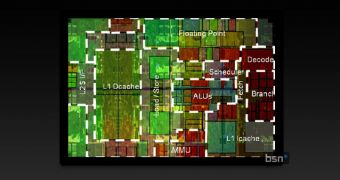Expected to arrive no earlier than 2013, Nvidia's Project Denver processors based on the ARM architecture will allegedly feature eight computing cores that will be paired together with 256 CUDA cores based on the Fermi architecture.
This information is based on the design targets set by Nvidia for the first silicon revision of Project Denver, and could see some changes until the CPU reaches its final design stages.
According to Bright Side of News, Nvidia is looking to keep Project Denver aligned with the upcoming Wayne SoC, also known as Tegra 4, which is expected to tape out in the next couple of weeks while developers are scheduled to receive the first prototype silicon in December 2011.
Also in December, Nvidia plans to tape out Project Denver, which will presumably include eight 64-bit custom designed ARM cores paired together with a GeForce GTX 600-class GPU.
General consensus is that Nvidia will take a rather conservative approach with the first version of Project Denver and that will release a single 28nm chip using a die shrink of the current Fermi-based GPUs.
Such a decision also seems to confirm the rumors that state notebook and entry-level GTX 600 parts will use a refresh of the Fermi architecture.
Moving back to Project Denver, this will most probably include 256 CUDA cores that will be clocked somewhere between 2.0 and 2.5GHz, a similar speed also being used for the CPU, while the memory controller and the remaining components will work at lower frequencies.
To further improve the performance of the chip, Nvidia plans to use a new approach when it comes to accessing memory and both the CPU and the GPU will be able to connect to the fast graphics memory via a controller that is similar to the one used in graphics cores.
However, this will be optimized for the CPU to have priority access to the memory, but Nvidia doesn't expect the ARM-based processor to require more than 20% of the total bandwidth available.
Together with the Project Denver and Wayne SoC chips, Nvidia is also working on developing motherboards for the notebooks, desktops and servers that will use these solutions.
From what we know at this point, the most important feature they will carry will be PCI Express 3.0 support, but users will also get native USB 3.0 and SATA 6Gbps.
The first generation of Project Denver chips is expected to be used inside blade servers and for GPGPU Tesla systems, which currently require AMD Opteron or Intel Xeon processors in order to run the operating system and other basic tasks that can't be handled by the GPU.

 14 DAY TRIAL //
14 DAY TRIAL //